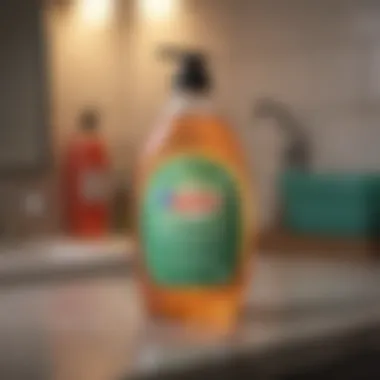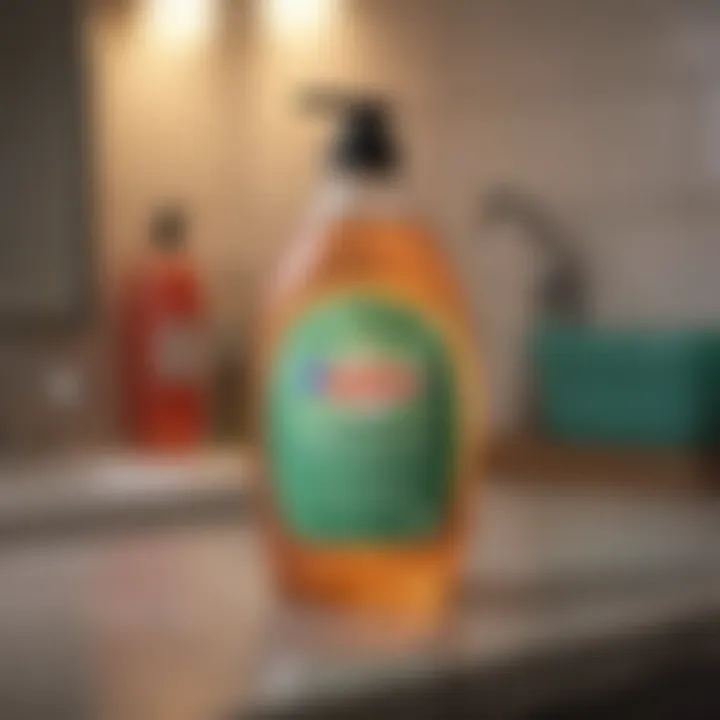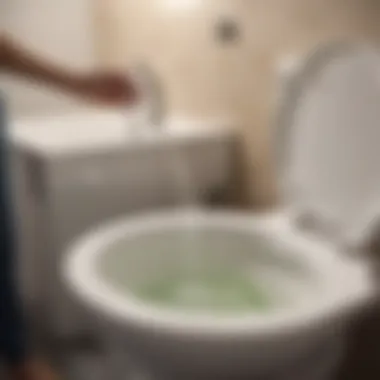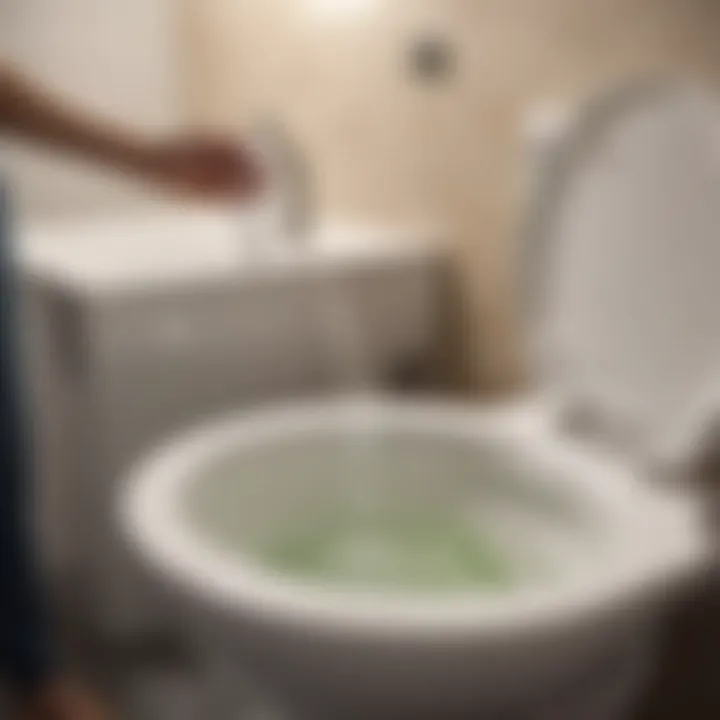Unclogging a Toilet with Dawn Dish Soap: A Practical Approach


Intro
Toilets are essential in every home, yet they can become clogged, leading to inconvenience and stress. One might think of using commercial products filled with harsh chemicals as the only solution, but there is a simpler, more eco-friendly method. Dawn dish soap has emerged as an effective alternative to clear out clogs. In this practical guide, we will explore the science behind the soap's effectiveness, while providing step-by-step instructions and additional tips to ensure successful unclogging.
Understanding the Effectiveness of Dawn Dish Soap
Dawn dish soap is not just ordinary soap. Its formula contains surfactants which help to break down grease and grime. This characteristic allows it to penetrate tough obstructions, assisting in dislodging clogs.
- Surfactants: They lower the surface tension of the water, allowing the soap to spread and work through the blockage more efficiently.
- Lubrication: The slippery nature of dish soap helps to lubricate the pipes, making it easier for the clog to move along the plumbing system.
Understanding these properties gives one confidence in using Dawn dish soap as a method in case of troubles with toilet plumbing.
Step-by-Step Instructions for Unclogging a Toilet
To effectively unclog a toilet using Dawn dish soap, follow these straightforward steps:
- Prepare the Area:
Ensure the bathroom is clear of any items that could get wet, including bath mats or towels. - Add Dawn Dish Soap:
Pour approximately one cup of Dawn dish soap directly into the toilet bowl. Let it sit for about 10 to 15 minutes. This waiting period allows the soap to work its way into the clog. - Hot Water:
After waiting, take a kettle and heat some water. Do not boil it. When it is hot, but not boiling, carefully pour it into the toilet from waist height. The impact can help to break up the clog further. - Flush:
Wait a few minutes and then attempt to flush. If the toilet flushes normally, congratulations, you have successfully unclogged it. - Repeat if Necessary:
If the toilet does not flush properly, repeat the process as needed.
Additional Tips for Success
While the above process is often effective, here are some added suggestions to enhance your success:
- Use Regularly: Maintaining a regular cleaning schedule with Dawn dish soap can help prevent future clogs.
- Avoid Mixing Chemicals: Do not mix Dawn dish soap with other household cleaners, as this can create harmful fumes.
"Using common household items for maintenance not only saves money but is also better for the environment."
Closure
Using Dawn dish soap for unclogging toilets is effective and practical. This guide provides clear steps on how to employ this method successfully while also shedding light on the science involved. With this knowledge, homeowners can tackle plumbing issues more confidently and sustainably.
Understanding Toilet Clogs
Understanding toilet clogs is fundamental for anyone who uses a toilet. Clogs can lead to frustrating situations, waste water, and cause damage to plumbing systems. A basic grasp of why clogs occur and their nature allows individuals to tackle these issues quickly and effectively. This is especially useful for homeowners who prefer DIY solutions, as it saves time and expense on professional help.
Nature of Common Clogs
There are various types of clogs that can occur in a toilet, and knowing these can help. The most frequent types of clogs include:
- Paper Products: Excessive toilet paper use is one of the main culprits. This can go beyond normal usage, causing a blockage.
- Foreign Objects: Often, items like toys or personal hygiene products find their way into toilets. This kind of clog can be more serious since they are not meant to be flushed.
- Calcium Build-Up: Hard water in some areas creates mineral deposits. Over time, this can reduce the pipes' diameter, leading to slower drainage and clogs.
Each of these clog types may require different approaches to resolve. Understanding these elements can also guide preventative measures.
Causes of Clogs
Toilets can become clogged due to several underlying reasons. Recognizing these can empower homeowners to avoid future issues. Here are some common causes:
- Improper Flushing Habits: It's common for people to flush items that shouldn't be flushed. This includes paper towels, dental floss, or baby wipes.
- Old Plumbing: Aging pipes can be more susceptible to clogs. Years of residue build-up can hinder proper flow.
- Low-flow Toilets: While these toilets are designed for efficiency, they sometimes don’t use enough water to effectively clear waste, especially if the waste is substantial.
These causes highlight the importance of user behavior as well as plumbing conditions in managing toilet function. When armed with knowledge about the nature and causes of clogs, preventative measures can be taken to minimize occurrences.
Preface to Dawn Dish Soap
Understanding the role of Dawn dish soap in unclogging a toilet is crucial for homeowners and DIY enthusiasts. It represents a practical, cost-effective solution that leverages the soap’s composition for effective results. The benefits of utilizing Dawn dish soap extend beyond simple unclogging. Its properties can help alleviate stress during plumbing issues, making it an essential item in household maintenance kits.


Dawn is more than just a cleaning product; it has unique chemical properties that make it particularly suited for tackling tough clogs. The soap’s formulation combines surfactants and other cleaning agents designed to break down grease and food particles. This is why it becomes an effective tool for handling clogs in toilets, as it aids in the disintegration of waste and helps restore proper flow.
In this context, it is valuable to highlight not only the effectiveness of Dawn dish soap but also its accessibility. Most households already stock this commonly used dish soap, eliminating the need for specialized equipment or specific cleaning agents. Understanding how to use this ubiquitous product effectively can lead to successful unclogging, reducing the frustration often associated with plumbing issues.
Ingredients and Formulation
Dawn dish soap is formulated with a variety of ingredients that work together to create an effective cleaning solution. The primary components typically include:
- Surfactants: These are the main cleaning agents that help to lower the surface tension of water, allowing it to penetrate and dissolve grease. This action is essential when trying to break down blockages in the toilet.
- Emulsifiers: These substances help to mix oil and water, which is useful when grease is present in a clog. They keep the mixture stable, enhancing the soap's effectiveness.
- Fragrances and Dyes: While these additives make the product more appealing, they do not contribute directly to the unclogging process. However, they enhance the experience of using the product.
The specific combination of these ingredients gives Dawn its reputation as a powerful cleaner. Through a careful balance of these components, Dawn achieves remarkable cleaning results in a variety of applications, including in clogged toilets.
Cleaning Properties of Dawn
The cleaning properties of Dawn dish soap extend beyond mere surface cleaning. Its formulation plays a significant role in how it interacts with water and waste in a toilet. Some of the key cleaning properties include:
- Grease Cutting Ability: Dawn is particularly known for its capability to remove grease. This feature is crucial because many toilet clogs involve fat, hair, and other organic materials that can combine to create blockages.
- Foaming Action: When mixed with water, Dawn generates foam that helps to lift debris. This aids in breaking apart stubborn materials that contribute to clogs.
- Biodegradable Ingredients: Dawn utilizes biodegradable components in its formulation, which helps to minimize environmental impact while effectively cleaning. This is an important consideration for those conscious about the effects of their cleaning products.
In summary, the combination of Dawn's unique ingredients and their specific cleaning properties makes it a practical approach for unclogging toilets. Understanding these aspects is fundamental for successful application and long-term toilet maintenance.
The Science Behind Unclogging
Understanding the science of unclogging is crucial for effectively resolving toilet obstructions. Toilets may seem simple, but their mechanisms involve complex interactions between various elements, such as water, debris, and cleaning agents. This section will delve into how Dawn dish soap operates in conjunction with water and its impact on accumulated grease and debris, showcasing why it serves as an effective unclogging method.
How Soap Interacts with Water
Soap is a surfactant, which means it lowers the surface tension of water. When Dawn dish soap is introduced into a clogged toilet, its formulation enables it to penetrate deeper into the water, helping to dissolve the bonds of debris and grease that may be causing the blockage. This interaction is essential because:
- Surfactant Action: The soap molecules align themselves between the water and other substances, disrupting the cohesive forces which normally keep everything bound together.
- Enhanced Flow: This reduction in surface tension allows water to flow more freely. As the toilet is flushed, the combination of soap and water can more effectively carry waste down the drain, addressing the clog.
- Emulsification: The soap helps to emulsify oils and fats, breaking them down into smaller droplets.
Understanding these interactions clarifies why using dish soap is not just practical but also scientifically sound in unclogging toilets.
Impact on Grease and Debris
Grease and stubborn debris are common culprits in toilet clogs. The effectiveness of Dawn dish soap lies in its ability to tackle these materials directly. Here's how it works:
- Dissolution of Grease: Dawn is renowned for its ability to cut through grease. It binds with oily substances, enabling them to disperse in water rather than clumping together. This property proves particularly beneficial in environments where oils and bodily fluids mix.
- Debris Breakdown: Besides grease, many clogs involve solid waste. The soap's properties soften and displace softer materials, assisting in loosening more compact debris. The combination of warm water and soap enhances this breakdown process.
- Preventing Future Clogs: Regular use of Dawn during maintenance can help prevent future clogs by ensuring that potential build-up is managed before it turns into a serious obstruction.
In summary, the science behind using Dawn dish soap as an unclogging agent hinges on its surfactant properties and its impact on greasy and solid debris. Employing these scientific principles can significantly improve the efficiency of the unclogging process.
Step-by-Step Guide to Unclogging
Clogs are a common issue in households. Knowing how to tackle them is essential. This section provides a thorough guide on using Dawn dish soap. It outlines clear steps to follow. Each step is significant to ensure effectiveness. The method combines the use of basic household items. This creates a practical approach to unclogging toilets without harsh chemicals. Understanding each phase allows readers to feel empowered during the process.
Preparation Before Use
Preparation is a critical step in unclogging a toilet. First, gather all necessary items. You will need Dawn dish soap, hot water, and a toilet brush.
Next, clear the area around the toilet. This ensures you have space to work safely. Make sure to protect your hands. Wearing gloves is advisable as this will keep you hygienic. If available, place towels or rags around the base of the toilet. This helps absorb potential spills.
Taking these steps helps avoid a mess and ensures that you are ready for the procedure.
Application of Dawn Dish Soap
Applying Dawn dish soap is straightforward yet essential. Start by pouring approximately half a cup of Dawn directly into the toilet bowl. Be sure to do this slowly. This allows the soap to coat the sides and settle.


The concentrated formulas in Dawn will begin to break down the clog. It works especially well on greasy or oily buildups. Allow the soap to sit for a little time. Ten to fifteen minutes is sufficient, but more time can enhance its effectiveness.
Adding Hot Water
The next step involves adding hot water. Heat water on the stove or in a microwave. Make sure the water is not boiling, as this can damage the toilet's ceramic surface.
Once heated, pour the hot water into the toilet bowl. Aim to pour gradually so that the soap mixture does not overflow. The hot water helps activate the soap’s cleaning power. It also aids in loosening stubborn clogs. If the water level rises, pause to allow it to settle.
Waiting Period
After adding hot water, patience is crucial. Allow the mixture to sit in the toilet bowl for about 20 minutes. During this time, the Dawn soap and hot water work on the clog. They help to dissolve debris and grease.
Consider this period a time for the mixture to act effectively. Do not attempt to flush the toilet during this time. Flushing too early may push the clog deeper, which could complicate the situation further.
Flushing the Toilet
Once the waiting period is over, it's time to flush. This step is where you check the effectiveness of the previous actions. Stand a few steps back to observe the results.
If the clog clears, congratulations! You have successfully unclogged the toilet with Dawn dish soap. If the toilet does not flush properly after the initial attempt, you may repeat the process or consider other methods. Remember, persistence is key when dealing with plumbing issues.
Additional Methods for Persistent Clogs
When dealing with toilet clogs, sometimes, Dawn dish soap may not be sufficient to resolve the issue. This can be due to the severity of the clog or specific materials causing the blockage. Therefore, understanding additional methods for persistent clogs is crucial. These approaches can provide alternative solutions or supplement the use of dish soap. Properly addressing clogs can help maintain the longevity of your plumbing and avoid potential damage.
Using a Plunger
A plunger is one of the most traditional tools for tackling toilet clogs. It works through a combination of suction and pressure, dislodging blockages effectively. A standard toilet plunger, which has a flange, is designed specifically for use with toilets. It creates a tight seal at the toilet’s drain, allowing for efficient force application.
- Choose the Right Plunger: Make sure your plunger has a flange for optimal performance.
- Positioning: Insert the plunger into the toilet bowl, ensuring it covers the drain completely.
- Pumping: Use a steady up-and-down motion. Start gently to create some pressure, then increase speed.
- Check Progress: After several thrusts, lift the plunger to see if water drains. If not, repeat the process.
Using a plunger can be effective in clearing clogs caused by toilet paper or biological waste. However, if the clog is due to foreign objects, such as toys or personal items, a plunger may not suffice.
Enzymatic Cleaners
For persistent clogs that resist simpler methods, enzymatic cleaners present a viable alternative. These cleaners use enzymes to break down organic matter, including biological waste and grease. When seeking an eco-friendly solution to toilet clogs, enzymatic cleaners are a smart choice. They typically come in liquid or powder form, and application involves adding the product to the toilet bowl and allowing it to sit for several hours, or overnight, before flushing.
Benefits of Enzymatic Cleaners:
- Eco-Friendly: Many formulations are safe for the environment and reduce harmful chemicals in your plumbing system.
- Effective: Enzymatic solutions can be more effective than traditional cleaners when dealing with organic blockages.
- Preventive: Regular use can also prevent build-up in your plumbing, potentially reducing future clogs.
- Read Instructions Carefully: Always follow the manufacturer’s guidelines to ensure proper use and effectiveness.
- Apply Sufficient Quantity: Make sure enough cleaner reaches the clog to allow for thorough breakdown.
- Timing: Be patient; enzymes take time to work. Allow the product to sit as directed.
In summary, while Dawn dish soap can often resolve minor clogs, persistent issues may require the additional methods outlined here. Whether using a plunger or opting for enzymatic cleaners, both can enhance your efforts in maintaining a clear and functional toilet system.
Safety Considerations
Safety is a crucial factor when it comes to unclogging a toilet using any method, including Dawn dish soap. While using household items may seem straightforward, attention to safety practices ensures not only the effectiveness of the process but also the well-being of those involved. Here, we discuss important aspects of safety considerations.
Handling Dish Soap
Dawn dish soap is generally safe for household use. However, it is important to handle it with care. Here are several guidelines:
- Skin Contact: If you have sensitive skin, consider wearing gloves while using the soap. In most cases, skin contact does not cause any harm, but irritation can occur.
- Ingestion: Avoid swallowing dish soap. If accidental ingestion occurs, seek medical attention immediately.
- Eyes: Rinse your eyes thoroughly with water if the soap gets into them. Again, seek medical assistance if irritation persists.
Following these simple precautions can help mitigate risks while using Dawn for unclogging.


Environmental Impact
Many homeowners are concerned about the environmental impact of products used in cleaning and maintenance. When it comes to Dawn, it is worth mentioning the following points:
- Biodegradability: Dawn dish soap is recognized as biodegradable. This means that it breaks down naturally over time, reducing long-term environmental harm.
- Phosphate-Free: Some formulations of Dawn are phosphate-free, which is beneficial for aquatic life. Phosphates can contribute to water pollution, leading to harmful algal blooms in waterways.
- Responsible Use: It is wise to use the soap sparingly. Excessive use may lead to increased concentrations of chemicals entering water systems. Just use the amount necessary for effective unclogging.
Key Point: Using Dawn dish soap in moderation provides a cleaning solution that is both effective and gentler on the environment than harsher chemical alternatives.
When to Call a Professional
Unclogging a toilet can sometimes be managed with simple household items like Dawn dish soap, but there are scenarios when professional assistance becomes crucial. Knowing when to call a plumber can save you time, frustration, and potential cost from more serious damages.
Toilets are designed for specific functions, and persistent clogs can indicate underlying issues that need expert attention. If your attempts at unclogging do not yield results after several tries, it is likely a sign of a severe clog or a more complex issue in the plumbing system.
Identifying Severe Clogs
Signs of severe clogs can be quite noticeable. Persistent backups, strange noises when flushing, or water rising dangerously close to the rim can indicate that the blockage is not in an easily accessible part of the plumbing. The following symptoms may suggest serious plumbing problems:
- Multiple fixtures failing: If sinks or showers are also experiencing drainage issues, this points to a larger sewage line problem rather than just a toilet issue.
- Foul odors: Unpleasant smells can indicate a backup in the plumbing system that requires immediate attention.
- Water comes back up: If water rises in the toilet bowl or other fixtures upon flushing, it can signal a significant blockage.
When these symptoms arise, it is highly advisable to consult a professional plumber. They possess the necessary tools and expertise to diagnose the problem accurately and prevent further damage to your plumbing system.
Cost Considerations
Cost is often a major factor when deciding to hire a professional plumber. While DIY approaches such as using Dawn dish soap can be economical, they may escalate into more substantial expenses if the problem persists. Here are some financial factors to consider:
- Consultation fees: Many plumbers charge an initial fee to assess the situation. This may vary by location and the specific services involved.
- Complexity of the issue: The price may rise significantly if specialized tools are needed or if the problem requires extensive repairs.
- Long-term savings: Investing in professional help may prevent more costly repairs in the future, such as damage to pipes or flooring resulting from unaddressed clogs.
If the blockage continues despite repeated efforts, seeking professional help not only addresses the immediate issue but also provides peace of mind. Repairing or replacing damaged plumbing components before they lead to significant problems can save both time and money in the long run.
Preventive Maintenance Tips
Preventive maintenance is key for maintaining the functionality of toilets. Regular care can save time, effort, and money in the long run. It also reduces the frequency of clogs, which can cause inconvenience and potential damage to plumbing systems. Adopting a few simple habits can enhance the lifespan of your toilet and reduce the likelihood of recurring issues.
Regular Cleaning Routines
Establishing a regular cleaning routine is essential to keep your toilet in optimal condition. This routine should involve using appropriate cleaning products, including toilet bowl cleaners and disinfectants. Consider utilizing Dawn dish soap not just for unclogging, but also for general cleaning tasks.
- Clean the toilet bowl at least once a week. This can prevent buildup of grime and mineral deposits.
- Use a toilet brush along with cleaning products to scrub areas under the rim and around the bottom of the bowl.
- Ensure that your cleaning routine extends to the exterior parts of the toilet, including the tank and base.
- Periodically inspect the toilet for signs of leaks, cracks, or other issues.
Maintaining cleanliness can dramatically reduce the chances of clogs caused by debris accumulation.
Flushing Items to Avoid
Understanding what not to flush is equally important in preventing toilet clogs. Some items can cause blockages, leading to frustrating situations.
- Personal hygiene products: Items like sanitary napkins and cotton swabs should not be flushed as they do not disintegrate easily.
- Wipes: Even those labeled as "flushable" can clog pipes, creating problems.
- Food scraps: Avoid flushing leftover food, as this contributes to buildup.
- Excess toilet paper: Use a reasonable amount to prevent clogs from occurring.
Epilogue
The conclusion serves as a vital part of any article, and this one is no different. In the context of unclogging toilets with Dawn dish soap, it encapsulates the insights gained throughout the piece. It reiterates the practicality of using common household items for solving everyday problems. A clogged toilet can disrupt routine and create stress. Knowing an effective method, such as this, empowers individuals. It fosters a sense of self-sufficiency.
Summary of Methods
The article has unveiled several methods to tackle toilet clogs using Dawn dish soap. First, the preparation stage plays a critical role. Having the necessary tools, including a plunger and hot water, makes the process smoother. Second, applying the soap effectively enhances its lubricating properties. Followed by the application of hot water, its heat further helps to dissolve obstructions, particularly grease. The waiting period, albeit crucial, gives the soap time to work its magic. Finally, flushing the toilet tests the success of your efforts.
- Preparation - Gather all necessary items.
- Application - Use Dawn dish soap efficiently.
- Hot Water - Apply heat for dissolving debris.
- Waiting - Allow time for action.
- Flushing - Assess the result.
Final Thoughts on Utility
Utilizing Dawn dish soap for unclogging toilets is not just a practical choice; it is a resourceful one. This common product is readily available in most households. Its effectiveness can vary based on the specific nature of the clog, yet it presents a low-cost solution before considering professional help. In essence, the knowledge shared in this article can lead to saving both time and money, rather than relying exclusively on chemical cleaners or expensive plumbing services.















